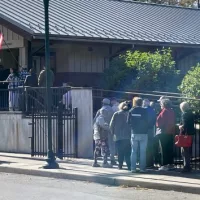
iStock/lucky-photographerBY: MARIAM KHAN
(WASHINGTON) — On Wednesday, the House is expected to take a pivotal first step in removing a bust of the fifth chief justice of the United States and Confederate statues from public display in the U.S. Capitol.
Democratic leadership expects the vote on a bill to do so to be largely bipartisan and a strong signal of support for the Black community after thousands took to the streets to protest police brutality and systemic racism in the wake of the death of George Floyd, who was killed in Minneapolis police custody in May.
Chief Justice Roger Brooke Taney, who was white, authored the majority opinion in the 1857 Dred Scott case that declared African Americans could never be citizens of the United States. The bill the House is voting on Wednesday would direct the architect of the Capitol to remove Taney’s bust and replace it with one of Thurgood Marshall, who in 1967 became the first Black justice to sit on the high court.
“This is an action we will take today of principle and conviction. Defenders and purveyors of sedition, slavery, segregation, and white supremacy have no place in this temple of liberty,” House Majority Leader Steny Hoyer, D-Md., said Wednesday.
The bill also requires states to reclaim and replace any statues in the National Statuary Hall Collection of individuals who volunteered for the armed services of the Confederacy during the Civil War, and it would also specifically remove three statues — of John C. Calhoun, Charles B. Aycock, and John C. Clarke — from the collection because of their roles in defending slavery, segregation and white supremacy, according to Hoyer’s office.
“Just imagine what it feels like as an African American to know that my ancestors built the Capitol, but yet there are monuments to the very people that enslaved my ancestors,” Rep. Karen Bass, D-Calif., said during a press conference Wednesday. “The People’s House, as I call the Capitol, can never really be for the people with reminders of the painful history that sought to continue the enslavement and control of the African-American population.”
“Personally, as a black lawmaker, the presence of these statues represent an acceptance of white supremacy and racism, something we are fighting day in and day out to dismantle,” she added.
Taney’s marble bust stands two-feet tall and sits prominently outside the Old Supreme Court Chamber inside the Capitol building, seen by millions of visitors each year.
Scott, an enslaved Black man, sued for his freedom in a case that spanned a decade and reached the highest court in the country.
Taney denied Scott’s case on the basis that enslaved people could not sue in federal court because they could never become citizens. The ruling also said the federal government could not ban slavery in its territories. It is often viewed as the worst decision in the Court’s history.
In a surprising twist, Scott’s great-great-granddaughter says she’d leave Taney’s bust exactly where it is.
“I’m not really a fan of wiping things out,” Lynne M. Jackson said in a telephone interview with The Associated Press earlier this week from her home in Missouri.
But, she added, she would encourage lawmakers to add a bust of Dred Scott to be displayed alongside Taney’s in the Capitol.
Jackson told the Associated Press that she believes memorials honoring figures like Taney need context. At the Capitol, the Taney statue sits in the “place where the Dred Scott case was decided,” but the fact he is “there by himself is lopsided,” Jackson said in suggesting a bust of Scott be added.
House Speaker Nancy Pelosi in June ordered the removal from the Capitol portraits of four of her predecessors who served in the Confederacy, saying that “we must lead by example.”
Pelosi has also recently renewed a decades-long quest to remove the remaining Confederate statues from the Capitol.
“While I believe it is imperative that we never forget our history lest we repeat it, I also believe that there is no room for celebrating the violent bigotry of the men of the Confederacy in the hallowed halls of the United States Capitol or places of honor across the country,” Pelosi said in a letter last month.
“This is not a partisan issue,” Hoyer said. “This is an issue about principles that America wants to lift up and display it to the rest of the world.”
A similar bill has been introduced in the Senate, but it’s unclear if the Republican-led chamber will take action anytime soon.
“I prayerfully anticipate that we can come together — Democrats and Republicans — to reject hatred and racism and to make it clear through a strong, bipartisan vote that statues of these individuals have no place in our Capitol,” Hoyer said.
Even if both chambers pass the measure and send it to President Donald Trump’s desk, it’s unclear if he would sign it. Trump has consistently defended preserving Confederate statues, Confederate-named military bases and the Confederate flag.
“… I’d say it’s freedom of, of — of many things, but it’s freedom of speech,” Trump said Sunday.
Copyright © 2020, ABC Audio. All rights reserved.















